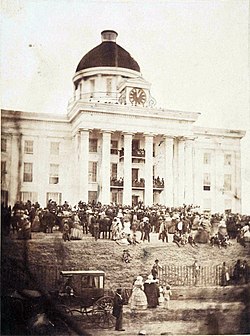The New York Times/1861/2/18/Inauguration of the President of the Southern Confederacy
INAUGURAL ADDRESS OF PRESIDENT DAVIS
Animated Debate in the Peace Conference
The Policy and Purposes of Secession

Washington, Monday, Feb. 18 -- The Peace Conference were in session, to-day, upwards of five hours. The debate was the most animated of any since the commencement of the Convention. The two reports from the Committee were under consideration. The propositions respecting the Territories, establishing or permitting Slavery south of 36 degrees 30 minutes, were opposed earnestly by gentlemen from New-York, Massachusetts, New-Hampshire, Ohio, Illinois and Wisconsin. Messrs. Tyler and Guthrie are leading advocates of the majority report, and earnestly urged upon the Convention immediate and direct action. They object decidedly to the proposition of Mr. Field, of New-York, for a National Convention, on the ground that before such a Convention can be held, unless some compromise be offered, or adopted, all the Border States will go out of the Union and will join the Southern Confederacy, binding themselves to that organization so strongly that the Convention will be powerless to effect a reorganization. The tone of Jeff. Davis' speech is alluded to by them to substantiate the determination declared by the States which go out, never to reunite with the North. A majority of Pennsylvanians, and some from all the Northern States, it is now thought, will accept the majority report, which, with all the Border State compromisers, will secure its adoption by a close vote. A canvass this morning of the Conference, shows only about half-a-dozen majority in its favor. The Slave State representatives say that its adoption, under such circumstances, and by such a vote, will be of no avail, and will not be accepted as settlement, as it will not be an expression of the wishes of the Free States. Several gentlemen have argued theses points at length. The feasibility and constitutionality of the propositions in the report were discussed at considerable length. The Anti-compromisers, headed by Messrs. Field and Notes, of New-York, Boutwell and Allen, of Massachusetts, and one Illinois man, as earnestly met these arguments. They object to a Direct compromise, as being of no binding authority, and unlikely to receive any sanction from Congress as the session is so nearly closed. They also object to them upon principle, and under threats, and to amendments to the Constitution by such process, and without careful deliberation. They could not see in them any remedy for existing difficulties, and only a problematical prevention of further complications and troubles. The same difficulties will exist after their adoption as now and even with these concessions granted, the Border Slave States will not consent to, no permit, any remedy for the frauds perpetrated by seceding States upon the Federal Government. The speech of Jeff. Davis, alluded to, published this morning, amounts in their estimation to a declaration of war, and yet gentlemen proposed that they should themselves do nothing about it. While the discussion was very spirited, the most amicable feelings were displayed on all sides. Mr. Tyler asked some of the Anti-Compromisers to-day, in a private conversation, if they would yield the Virginia proposition, the Crittenden Compromise, or anything against the spirit of the Chicago Platform. Or if direct compromise would not suit them as well as a National convention. He received a negative answer. He is said to have replied, that if they maintained that position through this wee, without action in the right direction for a settlement, there would no longer of any hope of adjustment, and they must prepare to recognize the consequences, or involve the country in civil war. He has not, he says, quite given up all hope yet. A proposition was to be made for evening sessions this week. Boutwell, of Massachusetts, made a long and eloquent speech, to-day, in Convention, against all compromise, said to be the most elaborate and able speech yet delivered. It attracted much attention and drew forth the debate which occupied the Convention all day. He went so far as to advise the Border States, as suggested by Somes, of Maine, in his recent speech in the House, of the necessity of conciliating and agreeing with the North for their own safety. Guthrie afterwards approached Messrs. Boutwell, Allen, Field, and Crowninshield, and said he did not stand upon his proposition, nor did Kentucky demand Crittenden's, or any particular measure, as an alternative, asking what they would give, and intimating that they would agree to anything which presented a basis of adjustment. They replied, offering a National Convention. They think this proposition rapidly gaining in favor, and express the belief that now no other can pass.
What is Thought of Jefferson Davis' Inaugural
Jeff. Davis' speech at Montgomery attracts considerable attention. His bragadocia and threats are the subject of ridicule, and excite no fear here. It is only tending to strengthen the anti-compromise feeling. His inaugural address, or that part of it which is received here to-night, but not yet made public, I learn from private sources, takes strong ground against reconstruction and compromise, and partakes more of the air of a military dictator than the head of a peaceful Republic. The Border-State men denounce Davis and his bombast without stint.
![]()
This work is in the public domain in the United States because it was published before January 1, 1929.
This work may be in the public domain in countries and areas with longer native copyright terms that apply the rule of the shorter term to foreign works.
![]()
Public domainPublic domainfalsefalse
